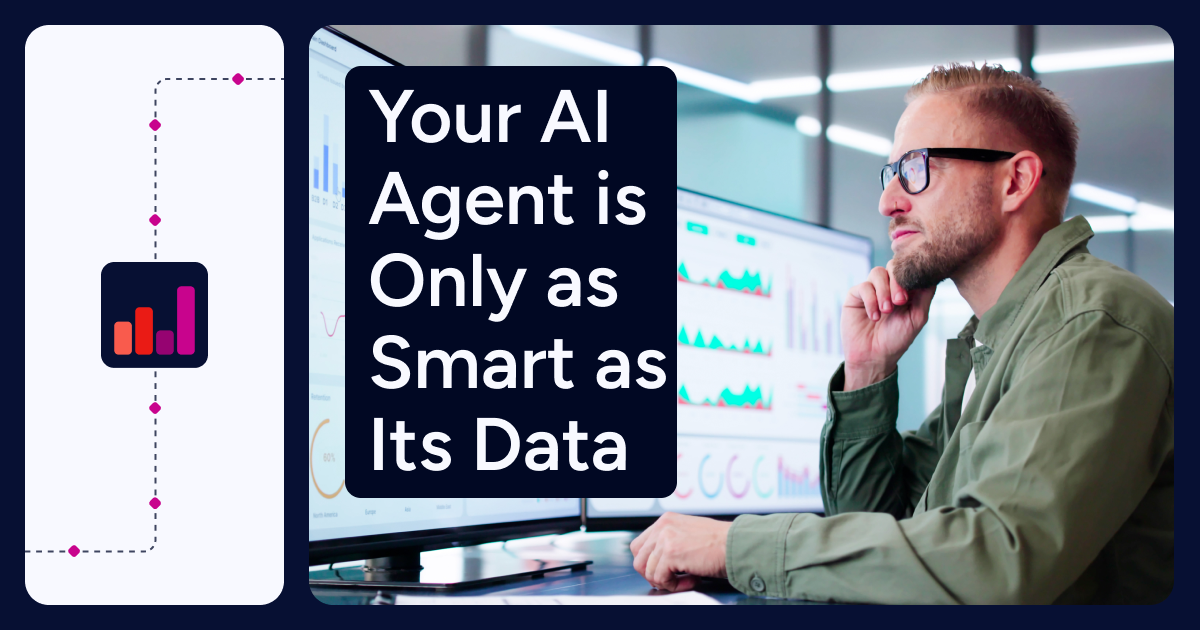The question in B2B tech is no longer whether to adopt AI, but how to wield it.
Mass-market AI apps like ChatGPT are now a fixture of our daily work. Internal chatbots connected through APIs are becoming commonplace. Enterprises are now building their own AI agents, aiming to tackle jobs once handled by third-party vendors.
But this increased sophistication also highlights a stubborn fact: too many AI deployments still aren’t delivering true return on investment. As a recent MIT study found, 95% of companies are seeing zero bottom-line impact from AI, despite spending an estimated $40 billion.
What’s the difference between experiment and impact? MIT says successful AI can “adapt, remember, and evolve,” customized and specialized for critical tasks.
One key element underlies it all: the quality of data powering your AI.
Where AI Works for Business (& How It Fails)
The most successful AI tools on the market are probably the least suited for business impact.
ZoomInfo’s 2025 State of AI in GTM survey, for example, found that chatbots and simple CRM assistant tools have the widest adoption in sales and marketing. But over 40% of AI users were dissatisfied with the accuracy and reliability of their AI tools.
MIT’s Project NANDA, which highlighted that only 5% of AI projects drive measurable business growth, reinforced those findings. “The same users who integrate these tools into personal workflows describe them as unreliable when encountered within enterprise systems,” the study says.
So what’s working? MIT found the AI initiatives that drive tangible growth have a few things in common:
Focus on one valuable problem
Embed directly into user workflows
Learn from real-time feedback
Adapt to each customer’s context
Avoid generic, one-size-fits-all tools
These are the driving forces behind AI agents. Instead of relying on broad-brush chatbots and assistant apps, business leaders are turning to “agentic” AI that leverages a core of reliable data, responds nimbly to fresh information, and is customized for specific tasks.
Reliable Data: The Foundation of Agentic AI Success
Anyone who’s prompted ChatGPT with incomplete or inaccurate information knows the routine: hallucinations, persuasive fibs, and wasted cycles. Because of the way their language models are designed, consumer chat apps are essentially rewarded for making up an answer before admitting they don’t have one.
Now imagine those quirky hallucinations and made-up statistics are just one step in a chain of tasks that your AI agent is supposed to tackle autonomously, with errors that compound faster than any human can respond.
That’s likely why corporate leaders remain hesitant to entrust mission-critical tasks to agentic AI systems. PwC’s AI Agent Survey, for example, found that 80% of leaders don’t trust agentic AI to handle fully autonomous employee interactions or financial tasks.
Top-performing GTM teams, on the other hand, already know that better data leads to better prompts, better workflows, and better outcomes.
A recent ZoomInfo study, for example, found that Fortune 500 companies leveraging advanced Go-to-Market Intelligence already register 5X revenue growth, 89% higher profits, and 2.5X higher valuations than peers.
Agentic AI will only amplify this effect.
GTM Intelligence: Fueling Agentic AI for GTM
Agents on their own are not the true differentiator. The market is already saturated with tools promising automation, efficiency, and AI-driven execution. As agentic AI becomes embedded in company systems, it’s harder than ever to distinguish one vendor from another.
We’re also seeing the return of an old SaaS dilemma: build vs. buy. The difference now is that building internally no longer requires years of engineering or ongoing maintenance. It can be done in days, often with minimal overhead.
At ZoomInfo, we’ve already built hundreds of internal agents, connecting our proprietary data with CRM, our go-to-market tools, and operational systems.
The impact has been profound:
Automating outbound plays by identifying accounts and delivering contextualized, contact-level outreach
Powering renewal workflows that monitor customer health and trigger proactive retention actions
Streamlining SDR engagement with personalized, use-case-driven messaging
We’re using our own GTM Intelligence Platform to drive efficiency at scale, with resource savings that compound over time. And this is only the beginning.
Our AI sales agent, ZoomInfo Copilot, is helping GTM teams deliver growth by surfacing actionable insights, suggesting outreach priorities, and creating tailored messaging at scale.
Users tell us they book 60% more meetings and demos and close 83% larger deals due to Copilot’s intelligent intent data and AI messaging. On average, Copilot users grew their Total Addressable Markets by 42% and achieved a 46% increase in win rates.
The fuel is ZoomInfo’s GTM Intelligence Platform, which combines industry-best B2B data and high-velocity buying signals. GTM Intelligence solves the context gap, empowering agentic AI to:
Prioritize the right accounts at the right time.
Contextualize outreach at the persona and buying-group level.
Execute ABM motions and sales plays with unmatched precision.
Where others promise AI-powered go-to-market, we deliver data-powered execution at scale, with confidence and without compromise.
Preparing for an Agentic AI Future
The era of agentic AI is just beginning. As the market matures, companies are realizing that the true battleground isn’t the interface, the model, or even the workflow. It’s the GTM Intelligence that makes everything else possible.
At ZoomInfo, we’re redefining what AI agents can achieve by fueling them with the richest, most actionable B2B data available.
That’s how you cut through the noise.


